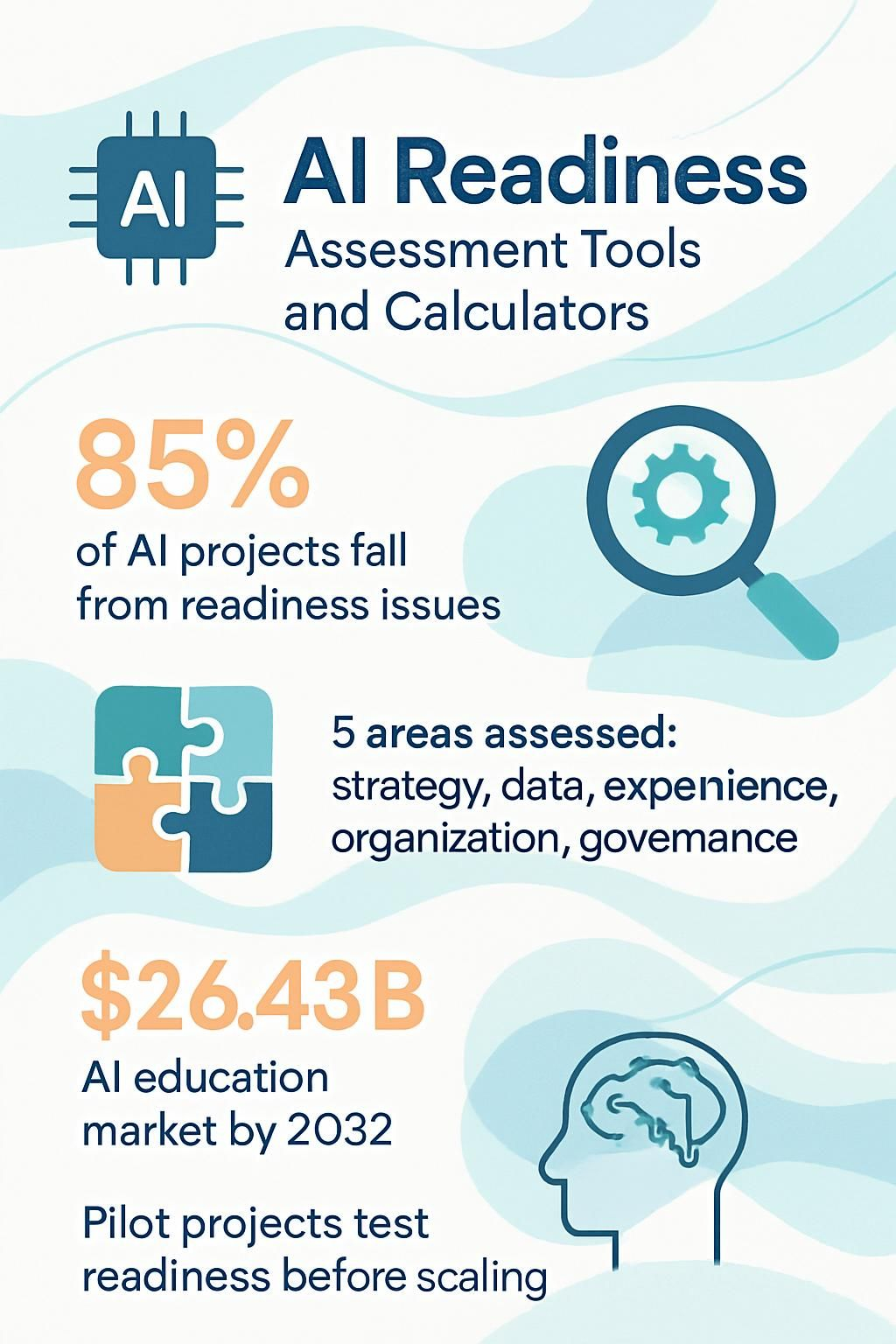AI Readiness Assessment Tools and Calculators


Understanding AI Integration

AI readiness tools help businesses figure out if they're ready to use artificial intelligence. These tools, like Saxon's assessment platform, check how prepared companies are across five key areas: strategy, data, experience, organization, and governance.
The process takes just five minutes but delivers valuable insights. You get an AI Readiness Score, your maturity level, tips for improvement, and a free strategy session. CIOs, CTOs, and innovation leaders use these tools most often to plan their AI journey.
Think of AI readiness calculators as your tech fitness trackers. They measure your company's AI health by looking at your data quality, tech infrastructure, available talent, and management processes.
The market offers many options, from Hurix Digital to Turnitin and Codio, each with special features like plagiarism detection or automated grading.
This isn't just a small trend. The AI education market alone will grow from $4.7 billion in 2024 to over $26 billion by 2032. That's a growth rate of 37.68% per year! These tools do more than give you a score.
They spot gaps in your infrastructure, create roadmaps with clear goals, and help build ethical frameworks for using AI.
As an AI Strategist who's built over 750 workflows and helped generate $200 million for partners, I've seen businesses waste time and money on AI without proper assessment. The right tool can mean the difference between AI success and an expensive tech headache.
Ready to see if your business can handle AI?
Key Takeaways
- 85% of AI projects fail due to poor organizational readiness rather than technology problems.
- AI readiness tools measure your company's preparedness across five areas: strategy, data/technology, experience, organization/culture, and governance.
- The AI education market is projected to grow from $4.7 billion in 2024 to $26.43 billion by 2032 at a 37.68% CAGR.
- Effective AI readiness calculators assess data quality, infrastructure, talent gaps, governance frameworks, and change management readiness.
- Starting with a small pilot project helps test your AI readiness before full implementation and creates valuable feedback for improvement.

Understanding AI Readiness Assessment Tools

AI Readiness Assessment Tools function like your business's tech fitness tracker. These digital calculators measure how prepared your organization is to adopt artificial intelligence systems across five key areas: strategy, data/technology, experience, organization/culture, and governance.
Most assessments take just 5 minutes to complete but deliver insights including your AI Readiness Score and current maturity stage. These tools serve as your AI GPS, showing both where you stand and mapping the fastest route to implementation success.
AI readiness isn't about having the fanciest tech stack; it's about knowing which AI muscles your business needs to flex first. - Reuben Smith
The best assessment tools simplify technical language to provide actionable tips suited to your specific business situation. With the AI in education market alone projected to grow from $4.7 billion in 2024 to $26.43 billion by 2032 (at a 37.68% CAGR), these tools help business leaders make strategic decisions rather than pursue trendy technologies.
CIOs, CTOs, and local business owners use these assessments to identify gaps in their innovation strategy before investing in technology that might not be effective. Many tools also offer free strategy consultations to help interpret results and plan next steps.
Key Features of Effective AI Readiness Calculators
Now that we understand what AI readiness tools do, let's examine what makes them truly effective. Great AI readiness calculators share specific features that separate the helpful from the "why-did-I-waste-my-time-on-this" variety.
- Data Quality Assessment - Top calculators evaluate your existing data infrastructure to spot gaps and quality issues before you waste resources on AI projects doomed by garbage data.
- Infrastructure Evaluation - These tools analyze your current tech stack to determine if you have the computing power, storage capacity, and network capabilities needed for AI implementation.
- Talent Gap Analysis - Effective calculators measure your team's AI literacy and identify specific skill gaps that require training or new hires.
- Governance Framework Scoring - The best tools assess your policies for data privacy, security protocols, and ethical guidelines to prevent costly compliance issues later.
- Change Management Readiness - Smart calculators gauge your organization's cultural readiness for AI adoption and highlight potential resistance points.
- Customization Options - One-size-fits-all is for cheap t-shirts, not AI readiness. Good calculators adapt to your industry, company size, and specific business goals.
- Performance Metrics Alignment - Top tools help establish clear KPIs to track AI project success against actual business outcomes.
- Plagiarism Detection Capabilities - Advanced calculators include features that identify copied content or code to protect intellectual property.
- Analytics Dashboard - Visual representations of your readiness scores make complex assessment data easier to understand and act upon.
- Personalized Learning Paths - The best tools create custom roadmaps that align AI initiatives with your specific business goals and timeline.
Want To Be In The Inner AI Circle?
We deliver great actionable content in bite sized chunks to your email. No Flim Flam just great content.

Steps to Leverage AI Readiness Tools for Business Growth
AI readiness tools can transform your business operations when used correctly. These digital assistants help map your journey from tech confusion to AI mastery without the typical headaches of digital transformation.
- Run a thorough assessment to spot infrastructure gaps using AI readiness calculators that measure your current tech stack against industry benchmarks. Many business owners skip this step and jump straight to implementation, which is like building a house without checking if the ground can support it.
- Create an AI strategy that links directly to your business goals and focuses on fixing actual problems rather than chasing shiny objects. Your strategy should target specific operational bottlenecks where AI can make the biggest impact.
- Clean up your data before any AI implementation because even the smartest AI system will fail with messy data. Think of data quality as the fuel for your AI engine; put in low-grade fuel, and you'll get poor performance.
- Set up clear governance rules to guide ethical AI use across your company. This step protects your business from potential PR disasters and legal issues while building customer trust.
- Upgrade your IT systems where needed based on assessment results. Some AI tools require more computing power than your current setup might offer, so budget for these upgrades as part of your implementation plan.
- Measure staff readiness through surveys and workshops to gauge resistance levels. The best AI system in the world will flop if your team refuses to use it or doesn't understand its value.
- Start with a small pilot project to test your AI readiness in real conditions. This creates a feedback loop that helps fine-tune your approach before a full-scale rollout.
- Track results against pre-set KPIs to prove business value and justify further AI investments. Numbers speak louder than promises in the boardroom.
Case Study: Organizational Preparedness in Action
A mid-sized company improved its AI adoption by conducting a thorough digital transformation readiness evaluation. The company enhanced its data readiness and performed a detailed skills gap analysis to support its overall organizational preparedness.
This approach paired a clear ROI measurement strategy with a structured assessment framework. The company conducted a rigorous capability assessment and revised its AI strategy to refine its infrastructure assessment and execution of key implementation strategies. Key improvements included:
- Establishing a robust scoring framework to track progress.
- Conducting regular technology adoption assessments to guide implementation strategies.
- Implementing a clear digital transformation readiness plan through actionable performance metrics.
Conclusion
AI readiness tools provide businesses with a clear plan for intelligent technology adoption. These calculators identify gaps in your data infrastructure, technical skills, and organizational culture before you invest in solutions that may not be effective.
Your assessment score serves as a strategic guide, indicating practical next steps specific to your company's needs. Many business leaders feel overwhelmed by AI possibilities, but proper assessment tools turn confusion into confidence.
Evaluating your capabilities today helps prevent costly mistakes in the future. Are you prepared to measure your AI readiness? Use a calculator, answer honestly, and allow the results to guide your progress toward becoming an AI-powered organization that delivers results.
FAQs
1. What are AI readiness assessment tools?
AI readiness assessment tools help companies check if they're ready to use artificial intelligence. They look at your data, skills, and tech setup. Think of them as a health check for your business before jumping into the AI pool.
2. How do AI readiness calculators benefit businesses?
These calculators spot gaps in your AI preparation that you might miss. They save money by stopping bad AI investments before they start. Companies using these tools often avoid the common pitfalls that make AI projects fail.
3. What factors do AI readiness tools typically measure?
Most tools check your data quality, staff skills, and current tech systems. They also look at your business goals and how AI fits with them. The best tools give you a roadmap with clear next steps, not just a score.
4. Do I need technical knowledge to use an AI readiness assessment?
You don't need to be a tech wizard to use basic assessment tools. Many are designed for business leaders without coding skills. Having someone with a technical background review the results will help you understand the deeper implications.
Have you considered how a comprehensive readiness evaluation could reveal hidden opportunities for improvement in your organization?
Disclaimer: This content is informational and not a substitute for professional advice. The insights and scoring framework described here reflect established industry benchmarks and evaluations used in AI implementation strategy.
Still Confused
Let's Talk for 30 Minutes
Book a no sales only answers session with a Workflow Guide
References and Citations
References
- https://www.tandfonline.com/doi/abs/10.1080/00185868.2024.2427641
- https://www.researchgate.net/publication/385852212_Five_Dimensions_of_AI_Readiness_AIR-5D_Framework-_A_Preparedness_Assessment_Tool_for_Healthcare_Organizations
- https://www.rishabhsoft.com/blog/ai-readiness-assessment
- https://www.fullstack.com/labs/resources/blog/ai-readiness-ai-development (2025-02-10)



